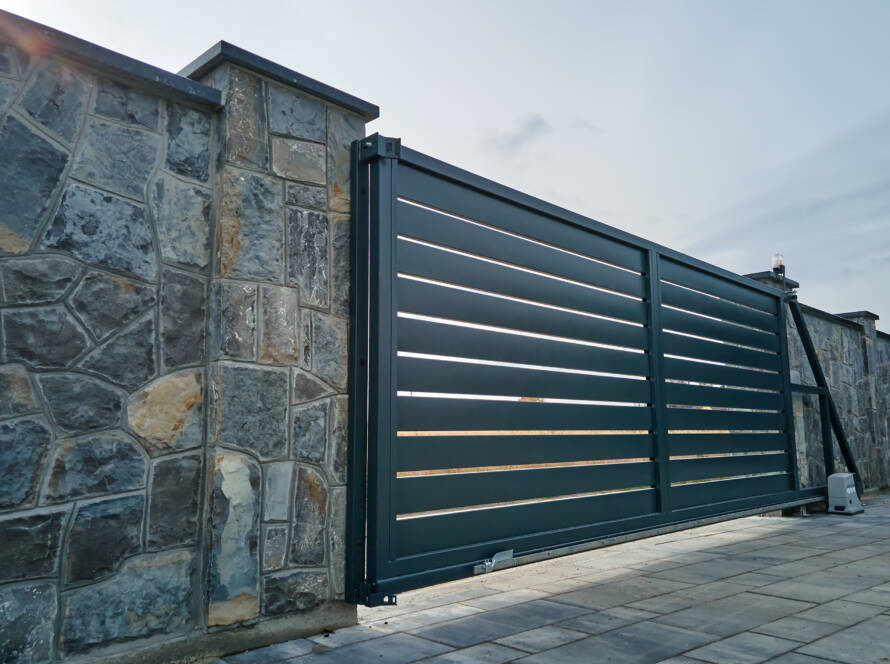Whether you want to improve your home’s security, increase privacy, make life more convenient, or add a touch of elegance to your driveway, electric gates are a fantastic investment for homeowners.
With so many benefits, it’s no surprise that an estimated 300,000 of us per year install electric gates in the UK.
However, before you commit to automatic gate installation, it is important to understand what the process entails. There are several crucial steps, from planning and design to compliance with legal requirements and ongoing maintenance.
At Windlesham Gates, we specialise in creating bespoke electric gates tailored to your property’s unique needs. Our team of professional engineers has over 65 years of combined experience in electric gate installation, making them uniquely qualified to explain what to expect.
In this comprehensive guide, our team will cover everything you need to know about automatic gate installation, including the process, legal considerations, maintenance, and key benefits.
Why Choose Electric Gates for Your UK Property?
Before delving into the installation process, let’s explore the advantages of electric gates in the UK:
- Increased Security – Automated gates provide an extra layer of protection, deterring trespassers and enhancing property security. Additional security features can add further benefits.
- Convenience – Control your gates remotely with a remote, tag system, keypad, or smartphone app, allowing seamless access.
- Property Value Boost – High-quality electric gate installation enhances curb appeal and can increase property value.
- Customisation Options – Choose from a range of materials, styles, and features to match your home’s aesthetics.
- Traffic Control – Ideal for properties with long driveways or commercial premises requiring controlled access.
Legal Considerations for Automatic Gate Installation in the UK
Ensuring compliance with UK regulations and legal requirements is essential. Here’s what you need to know before installation:
- Most of the time, electric gates fall under permitted development, but planning permission is required if your gate exceeds 2 metres in height, or 1 metre if it is near a public highway. When adding a new electric gate to your property, it is always advisable to consult with your Local Council.
- Special permissions may be needed to install electric gates if your property is a listed building (or in the curtilage of one) or in a conservation area.
- In accordance with the Highways Act 1980, swing gates cannot open outwards onto a public road, highway or pavement in a way that obstructs it. Therefore, swing driveway gates must either open inwards, or be set far enough within your property to open outwards without encroaching on public land.
- Your electric gate installation must comply with UK safety standards, such as BS EN 12453 and BS EN 12604, to prevent entrapment and accidents.
Always work with accredited electric gate installers to ensure full compliance.
The Electric Gate Installation Process
At Windlesham Gates, we follow a meticulous approach to ensure a smooth and efficient automatic gate installation. Below is a step-by-step guide to the process.
Step 1: Initial Consultation and Site Survey
The first step in the installation process involves a detailed consultation and site survey. Your professional electric gate installers will visit your property to assess your space, noting key factors such as driveway dimensions, potential obstacles, and any specific requirements you may have.
The soil and ground conditions will also be evaluated to determine if any preparatory groundwork is needed, especially for underground motors. If you are installing a sliding gate, this stage will also verify that the ground can support the weight of the track and gate.
Additionally, an assessment of the power supply will be conducted to ensure there is an adequate electrical source to support the automation system.
This stage also includes a full safety evaluation to identify any potential hazards and guarantee compliance with UK regulations.
Step 2: Custom Design and Material Selection
Once the site has been surveyed, the next step is to design a bespoke gate that suits your functional and aesthetic needs. First, decide whether you want a swing, sliding, or bi-parting gate style. Consider if a contemporary or traditional design would suit your property and preferences.
For any gate, there are various materials to choose from, including aluminium, which is lightweight and rust-resistant, wrought iron for a more traditional yet still durable option, hardwood such as Accoya for a natural and premium look, or steel for maximum strength and security.
The design process also allows for further customisation with a selection of RAL colours and finishes, decorative features, gate accessories, and access control preferences, to ensure that the final product aligns with your style, security, and safety requirements.
Step 3: Installation and Automation Setup
The installation phase begins with setting up the gate frame and support posts. Depending on the type of gate selected, the appropriate automation system is fitted, which could include underground motors for a seamless look, above-ground arms for swing gates, or sliding mechanisms for properties with limited space.
The power supply and control system are then connected, ensuring that the automated features function smoothly.
During this stage, your electric gate installers will make sure that all components are properly aligned, guaranteeing flawless operation once the gates are fully functional.
Step 4: Final Safety and Compliance Testing
Before completing the installation, a series of tests are carried out to ensure the gates meet UK safety standards and regulations.
This includes verifying that photocell sensors are correctly installed to detect obstacles and prevent accidental closures. Force limitation settings and safety edges are tested to ensure that the gates automatically stop when resistance is detected, minimising the risk of injury.
Emergency stop mechanisms are also checked to confirm that manual override options are in place in case of power failure.
These safety measures are essential for ensuring that the electric gates operate efficiently and safely. Final testing allows any necessary adjustments to be made by the electric gate installers.
Choosing the Right Electric Gate Installers
Selecting the right company for your electric gate installation is crucial to ensuring a smooth and stress-free process.
A reputable installer should have industry accreditations such as Gate Safe or DHF (Door & Hardware Federation) certification, which demonstrate compliance with UK safety standards.
Experience is another key factor; a company with a strong track record and positive customer testimonials will provide peace of mind that your project is in safe hands. It is also advisable to choose a provider that offers a comprehensive service, including design, installation, repairs, and ongoing maintenance, as this ensures long-term support.
Warranty coverage is another consideration – reliable installers will offer guarantees on both the gate and automation system, protecting your investment.
At Windlesham Gates, our highly skilled electric gate installers bring over 65 years of combined experience, ensuring a professional and personalised service from start to finish.
We take pride in delivering high-quality electric gates that are safe, durable, and tailored to your specific requirements.
Maintenance Tips for Electric Gates
Regular post-installation maintenance is recommended to maximise the lifespan and efficiency of your electric gates in the UK:
- Routine Cleaning – Periodically remove debris from tracks and hinges, and wipe the gate clean as instructed by the manufacturer.
- Lubrication – Apply grease to moving parts to prevent wear.
- Motor Inspections – Schedule annual servicing to detect faults and prevent mechanical issues early.
- Safety Checks – Regularly test sensors, photocells, force settings, and manual overrides.
By following these maintenance tips, you ensure your electric gates UK remain in peak condition.
FAQs About Electric Gate Installation
Q: How much does electric gate installation cost in the UK?
A: Costs vary depending on material, automation type, and installation complexity. Expect prices to start from several thousand pounds for high-quality bespoke gates.
Q: How long does installation take?
A: From consultation to completion, the process usually takes 4 – 6 weeks, depending on customisation and groundwork requirements.
Q: Do electric gates work during a power cut?
A: Yes, most systems include a manual override or backup battery to ensure continued operation.
Q: Are electric gates secure?
A: Yes, they enhance security through automated locking, access controls, and integration with CCTV and intercom systems.
Q: Can I automate existing gates?
A: In many cases, yes! We can retrofit automation systems to suitable existing gates.
Get Started with Windlesham Gates
Investing in bespoke electric gates is a smart choice for any homeowner seeking security, convenience, and elegance.
From design to installation and maintenance, Windlesham Gates offers expert services tailored to your needs.
Ready to start your electric gate project? Contact us today to schedule your consultation and transform your property with high-quality, bespoke electric gates in the UK.



